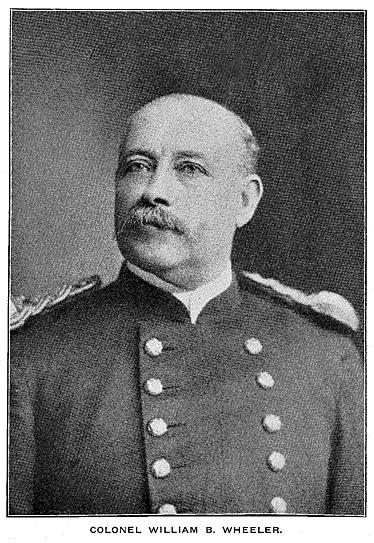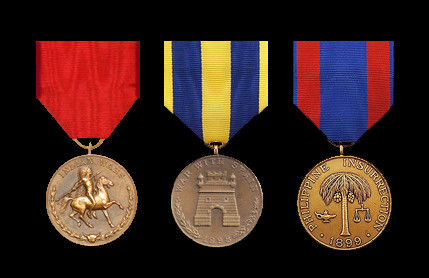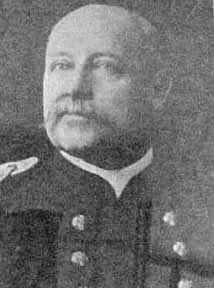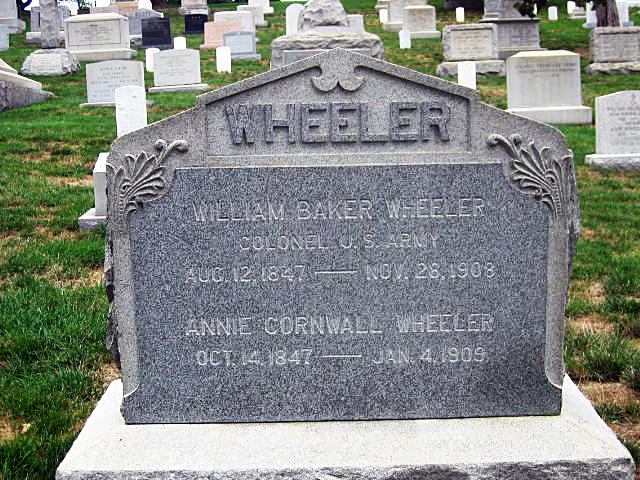

William Baker Wheeler
Commanding Officer 22nd Infantry
October 11, 1905 - February 17, 1906
William B. Wheeler was born in
New York on August 12, 1847. He was appointed to the US Military
Academy
from Iowa on July 1, 1867. At the Academy his best subjects were
Artillery Tactics and French and his worst subjects
were Spanish and Cavalry Tactics. He graduated 31 out of a class
of 43 on June 12, 1871 and was commissioned
a 2nd Lieutenant in the 18th Infantry.
Wheeler served in garrison at
Columbia, South Carolina from October 1 to 12, 1871 and then at
Yorkville, South Carolina
to January, 1872 when he returned to duty at Columbia. He took a
leave of absence from June 2 to August 30, 1874.
On January 5, 1877 he was detailed as an Aide-de-camp to Colonel
Thomas H. Ruger, commanding officer of the
18th Infantry who, as a Brevet Major-General was detailed as
commander of the Department of the South.
Wheeler took a leave of absence
from June 17 to August 5, 1877. He was relieved of his
Aide-de-camp duties
and was on garrison duty at Atlanta, Georgia from July 1, 1878 to
April 12, 1879 and on frontier duty at the
Coal Banks, Montana from May 7 to September, 1879. He was then at
Cow Island, Montana until November 20, 1879
when he changed duty station to Fort Assinniboine, Montana.
He was on detached service from
October 10, 1881 to January 11, 1882 and was promoted to 1st
Lieutenant on February 6, 1882.
From May to September 30, 1883 he was stationed at Fort Maginnis,
Montana. Then he was at Fort Assinniboine until
May 30, 1885 and at Fort Hays, Kansas until September, 1889. He
was on duty at Fort Clark, Texas from September 1889
to March, 1890. During most of the above years Wheeler was
assigned to Company B, for certain, at least, from 1879 through
1890.
In March 1890 he was placed in
command of Camp San Filippe, Del Rio, Texas. On February 20, 1891
Wheeler was
promoted to Captain and also given command of Company I. From May
to September 1891 he was stationed at Fort Clark,
Texas and then went to Fort Ringgold, Texas. From the fall and
winter of 1891 to well into 1893 he participated in operations
against Revolutionists during the "Garza outbreak".
This was one of a number of "revolutions" which broke
out in Mexico
against the rule of General Jose de la Cruz Porfirio Díaz Mori.
Revolutionists crossed the border into the United States
and the U.S. government allowed Mexican forces to pursue them in
concert with U.S Army units giving assistance
to the Mexican authorities. In 1892 Wheeler was given command of
Company E.
From May 1894 to April 1898
Wheeler was on duty at Fort Sam Houston, Texas. He was with the
Regiment in camp
at New Orleans, Louisiana in preparation for deployment to Cuba
from April 20 to May 21, 1898. In the event, the
18th Infantry was sent to the Philippine Islands instead. He went
to Camp Merritt, San Francisco, California on May 29, 1898
and left for the Philippines on June 14. He arrived in the
Philippines on July 17, 1898 as part of the Second Philippine
Expedition
under Brigadier-General Greene.
Wheeler participated in
operations in front of Manila from July 21 to August 13, 1898 and
in the battles of
Malate and Manila and the capture of Manila on August 13, 1898.
He commanded Company E as part of the
1st Separate Brigade and in the expedition to Iloilo, Island of
Panay and participated in the capture of Iliolo
on February 11, 1899. He took part in the capture of Jaro on
February 12, 1899 and in affairs with insurgents
near Jaro on March 1 and March 16, 1899.
On September 8, 1899 he was promoted to Major of Infantry, 18th Infantry.
From September 27, 1899 to March
11, 1901 Wheeler was on recruiting service in New York City. He
was on
sick leave from March 11, 1901 to June 15, 1902. He returned to
the 18th Infantry and commanded a battalion
at Fort Logan, Colorado until February, 1903.
On February 4, 1903 Wheeler was
promoted to Lieutenant Colonel of the 10th Infantry.
He was transferred to the 2nd Infantry on May 18, 1903 and
remained with that Regiment
until October 6, 1904 when he went on sick leave to January 28,
1905 and then took another
sick leave to January 22, 1906.
While on this extended sick
leave, on October 11, 1905 he was promoted to Colonel of the 22nd
Infantry.
His case was before the retiring board and on February 17, 1906
he was retired with a disability in the line of duty.
William B. Wheeler died November 28, 1908 at Gainesville, Florida at the age of 61.

William B. Wheeler's decorations

This portrait of Colonel Wheeler hung
on the wall at 1st Battalion 22nd Infantry Headquarters
at Fort Hood, Texas, 1999-2009. Photo courtesy of Major Anne
LeGare, wife of LTC Marc LeGare,
Commanding Officer 1-22 IN 1999-2001.
WILLIAM BAKER WHEELER. No. 2400. CLASS OF 1871.
Died November 28th, 1908, at Gainesville, Florida, aged 61.
COLONEL WILLIAM BAKER WHEELER
was born in Chaumont, New York, August 12th, 1847.
His father, William Wheeler, moved to Marshalltown, Iowa, in
1854, and the subject of this sketch was educated
in the schools of that town.
Cadet at the United States
Military Academy, from July 1st, 1867, to June 12th, 1871, when,
he was graduated and promoted
in the Army to Second Lieutenant Eighteenth Infantry. Served at
Yorkville and Columbia, South Carolina until January 1877.
Engaged in the delicate and trying duties incident to the
suppression of the Klu Klux Klan movement and was so successful
as to win the approval of that sterling soldier and upright man,
Major General Ruger, who appointed him Aide-de-Camp.
He also won the heart of Mrs. Annie Cornwall Smith, whom he
married at Jacksonville, Florida, February 19th, 1878.
In garrison at Atlanta, Georgia, July 1st, 1878, to April, 1879;
on frontier duty at the Coal Banks and Cow Island, Montana,
May to November, 1879; Fort Assiniboine,Montana, to May, 1883.
Promoted First Lieutenant
Eighteenth Infantry February 6th, 1882. Fort Maginnis, Montana,
to September, 1883;
Fort Assiniboine, Montana; to May, 1885; Fort Hays, Kansas, to
September, 1889; Fort Clark, Texas, to March, 1890.
Promoted Captain Eighteenth
Infantry February 20th, 1891, while in command of Camp San
Felippe, Del Rio, Texas.
Engaged in the suppression of the Garza Revolution against
Mexico. Served on the Rio Grande frontier until 1894; at
Fort Sam Houston, Texas, until the outbreak of the
Spanish-American War. Left San Francisco, in command of Co.
"E"
Eighteenth Irifantry, with the Second Philippine expedition under
Brigadier General Greene, June 14th, 1898; participated
in the operations in front of Manila, from July 21st to August
13th, 1898, and in the battle of Malate and capture of Manila;
commanded his company in the First Separate Independent Brigade
in the expedition to Panay; participated in the capture
of Iloilo, Jaro bridge and the City of Jaro; engaged in numerous
engagements with Insurgents around Jaro, serving part
of the time as Major, until broken in health he was sent home on
sick leave, November, 1899, a complete physical wreck.
The American soldier has
successfully accomplished many hard tasks but he has never faced
more trying, disagreeable,
wearing duty than that of chasing, fighting, pacifying and
conciliating the Malayans, and he has done this with credit
to his manhood and honor to his humanity and forbearance.
Promoted Major and assigned to
the Eighteenth Infantry September 8th, 1899. In 1900 and 1901,
though suffering
from disease, he was on recruiting service in New York City.
Promoted Lieutenant Colonel of
Infantry, assigned to the Tenth Infantry, February 4th, 1903;
transferred to the Second Infantry;
promoted Colonel of Infantry, October 11th, 1905, assigned to the
Twenty-second Infantry. For a short time
he was in command of Fort Logan, Colorado, but he never recovered
his health and was retired February 17th,
1906, from the effects of his Philippine sickness which was the
ultimate cause of his death.
His loving wife soon joined him,
dying January 4th, 1909. Two children survive him: Mrs. Sallie
Austin Hutchinson
and William Darrow Wheeler, and a stepson, Harry Cornwall (Smith)
Wheeler.
"Billy" Wheeler was a
most loveable, genial classmate, the soul of honor, full of fun,
a true friend, a manly man,
yet as kindly hearted as a woman. Plebes looked upon him as a
protector; enlisted men as a just guardian;
officers as a sterling comrade and stout soldier, beloved by all
who knew him.
He was a great sufferer during
the last years of his life, but never complained, accepted his
affliction like a Spartan
and was gentle, patient and brave to the end.
C. A. W. ¹
William Baker Wheeler died on
November 28, 1908
and is buried in Arlington Cemetery Plot: Sec: 2, Site: 1131

The grave monument for William Baker Wheeler
Photo by Loretta Castaldi from the Find A Grave website
¹ Fortieth Annual Reunion of the Association
& Graduates of the United States Military Academy, at West
Point, New York,
June 10, 1909, Seemann and Peters, Saginaw, Michigan 1905
Home | Photos | Battles & History | Current |
Rosters & Reports | Medal of Honor | Killed
in Action |
Personnel Locator | Commanders | Station
List | Campaigns |
Honors | Insignia & Memorabilia | 4-42
Artillery | Taps |
What's New | Editorial | Links |